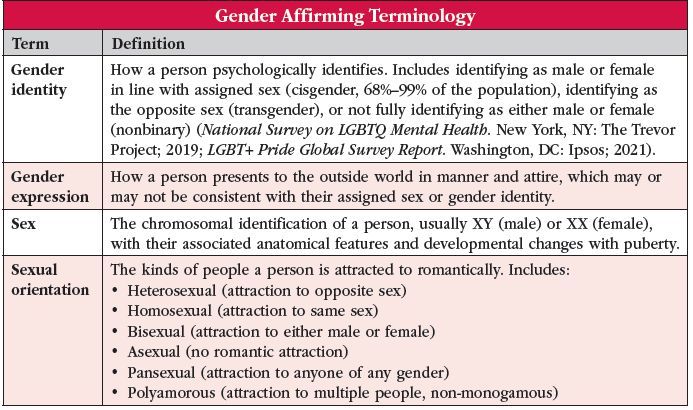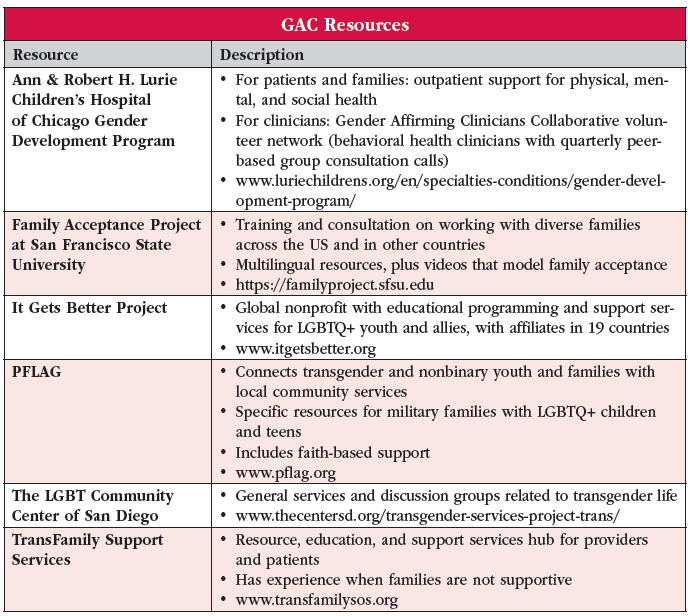Gender Affirming Care in Children and Adolescents: A Primer
Child and adolescent psychiatrists are seeing increasing numbers of transgender and gender diverse children and teens. This article will help clinicians understand the basics of gender affirming care (GAC) as they work with families around issues of gender dysphoria (also see our feature interview with Dr. Peter Daniolos). For a quick review of related terminology, see “Gender Affirming Terminology” table.
What is GAC?
GAC refers to approaches that clinicians can offer to patients who seek a gender expression that differs from their assigned sex. This care may include:
- Social transition (eg, dressing and grooming to reflect their gender identity)
- Hormone treatment that delays the development of secondary sex characteristics
- Hormone treatment that creates secondary sex characteristics of a different sex
- Surgical procedures that change gender expression (eg, electrolysis, facial and tracheal cosmetic surgery, mastectomy, phallectomy, vaginoplasty, and phalloplasty)
Avoid thinking about outcomes in binary terms. Many patients desire some but not all possible treatments or surgeries.
Who provides GAC?
Patients receive GAC from specialized health centers, nonprofit organizations that provide reproductive health care, college health centers, or individual endocrinologists and surgeons.
The World Professional Association for Transgender Health (WPATH) Standards of Care offer guidance on when it is appropriate to provide GAC for patients (www.wpath.org/publications/soc). Their recommended criteria include:
- Persistent, well-documented gender dysphoria (see also CCPR July/August/September 2020)
- Capacity to make a fully informed decision and to consent for treatment
- Reasonable stabilization of significant medical or mental health concerns
- Ability to make independent decisions about GAC through meeting legal age requirements for the patient’s state of residence

Mental health impact of GAC
Gender diverse youth are at higher risk for mental health conditions, such as depression, and have a higher risk for suicidal behavior (Surace T et al, Eur Child Adolesc Psychiatry 2021;30(8):1147–1161). Trans youth are also at higher risk of victimization, particularly Black trans females (Johns MM et al, MMWR Morb Mortal Wkly Rep 2019;68(3):67–71).
Mental health problems are exacerbated by gender conversion therapies that purport to change a person’s sexual orientation. Methods typically used in such therapies include behavioral modification, teaching stereotypical gendered behaviors, use of hormones, and faith-based approaches citing prohibitions against non-cisgender sexual orientation (www.tinyurl.com/2veb8sxa). The American Psychiatric Association has a policy statement discouraging conversion therapies and respecting the gender identities and sexual orientations of individuals (www.tinyurl.com/3unmvzbc). For a list of support organizations and educational resources for patients and families, see “GAC Resources” table.
GAC reduces risks of gender dysphoria for gender diverse youth, in one study reducing depression rates by 60% and suicidality by 73% in patients ages 13–20 over the course of 11 months (Tordoff DM et al, JAMA Netw Open 2022;5(2):e220978).
Treatment at different ages
Pre-puberty
Young/pre-pubertal children typically receive no medical treatment but may embrace a social transition, dressing in a manner consistent with their psychological gender identity, asking to be called by a different name, and preferring consistent pronouns (see “Pronouns Explained” box).

Pubertal children with gender dysphoria are developing secondary sex characteristics that they may not want. GAC for these children usually employs gonadotropin-releasing hormone (GnRH) analogues that suppress the process of puberty, typically offered at Tanner Stage II/IV. This buys time to fully explore the stability of their identity. Moreover, preventing the development of secondary sex characteristics reduces later need for surgeries such as mastectomy for trans males and facial feminization and tracheal shaving for trans females.
Later adolescence
In later adolescence, patients typically begin gender affirming hormones, also known as hormone replacement therapy (HRT). This includes estrogen and progesterone to support breast development and shift fat distribution for trans females; and testosterone or analogues for trans males to support growth of facial hair and increased muscle mass. WPATH guidelines recommend beginning HRT at age 14–16, although this range is somewhat arbitrary and some patients begin earlier to have a better chance for an appearance more consistent with their gender identity (D’hoore L et al, J Intern Med 2022;291(5):574–592). Of note, some people seek HRT while away at college, taking charge of their own health care. Breasts and beards take months to develop, but it may surprise family and others when the student visits home with a changing gender expression. Surgical procedures are typically available at the age of majority in the country or region where the person resides, although chest masculinization may be available earlier in some places.
Risks associated with GAC
What if a person undergoes irreversible transition and changes their mind? Most patients do not regret their decision to transition even if they later choose to stop the process. Recent research shows that 13% of people who started hormone treatment chose to discontinue it. However, 83% of those who discontinued did so due to external factors such as threats (Turban JL et al, LGBT Health 2021;8(4):273–280). Over 98% who start HRT in adolescence continue it. One recent concern, however, is the negative effect of GnRH analogues on bone density, and we anticipate new recommendations for bone density monitoring for these patients (Biggs M, J Pediatr Endocrinol Metab 2021;34(7):937–939). A more clear-cut risk, however, is that trans appearance puts people at risk for suffering violent attacks (Flores AR et al, Am J Public Health 2021;111(4):726–729).
CARLAT VERDICT
Becoming conversant in GAC to understand the needs of your patients who seek such services. The biggest risks with these patients are related to suicidality, and GAC has an important role in reducing depression and suicidality in this population.



_-The-Breakthrough-Antipsychotic-That-Could-Change-Everything.webp?t=1729528747)



